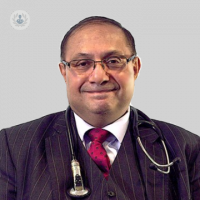Managing syncope: how should it be treated?
Autore:Syncope can cause a range of symptoms that can impact day-to-day life. Luckily, in recent years there have been many developments to help manage and treat the condition and new innovations continue to be explored.

We spoke with Dr Mashkur Khan, a leading specialist in general internal medicine, who spoke to us about the syncope, how treatment has improved and what the most effective ways of treating it are.
How has the management of syncope developed over the years?
We have a much better understanding of the better pathophysiology of syncope and we are able to understand the multifactorial nature of syncope. We can now do more sophisticated tests such as sweat tests, we also can do tests that are prolonged, tilt table, with and without food, which is a development for us and we also have a multidisciplinary approach endocrinology team.
Heart doctors and people like myself offer a more holistic approach, physiotherapy for physical counter manoeuvres and new drugs such as:
- Droxidopa
- Midodrine
- Fludrocortisone
We are waiting for major trial results of two very new drugs that are reuptake inhibitors:
- Atomaxitine
- Ampreloxetin
We’re looking forward to these results. Other major developments include, a protocol that can treat supine hypotension. It’s a condition when your heart beat goes really high (to 180 to 200 BPM) and then suddenly comes crashing down, it can cause injuries.
We now also have better tools to treat bladder, constipation and other complications, difficulty with sweating, dry mouth dry eyes and swallowing.
We also know how to look at patients’ salt levels, a lot of people lose salt, especially in older patients, we can check that by doing tests.
Another big thing is a condition called PoTs, usually younger patients physically very fit, athletes, are usually very health conscious, they often have an overlap of chronic fatigue from a virus.
A lot of ex COVID-19 patients have chronic fatigue syndrome ME or PoTs. When a patients stands up after sitting or lying down their heart rate goes up to 100bpm or 130bpm, what we do is stand for 20 mins and we treat them with midodrine but they should speak to a specialist like myself.
How is syncope treated today?
The Framingham study says that if there are recurrent problems if you repeatedly have syncope it can impair the quality of your life, if you come to a good specialist like myself you can live a near-normal life. A lot of my patients now live normal lives. Often they will carry a pill in their pocket, if they begin to notice warning signs, they can take it, have some water and wait.
Some people who go shopping, carry some water, they have a pill, and they feel better within half hour. Some have a pacemaker but this is rare and usually drug therapy is sufficient.
What are the most effective ways of treating syncope?
Most effective ways are a multidisciplinary approach, as a syncope expert I would say it is the tailored exercises, programmes in the community, medication reviews and streamlining treatment. Specialist medication that can depend on the condition and the type of syncope, there’s treatment for everyone, depending on the condition and what type.
To receive treatment for syncope we recommend booking an appointment with an expert such as Dr Mashkur Khan . Visit his Top Doctors profile today for information on appointment availability.


